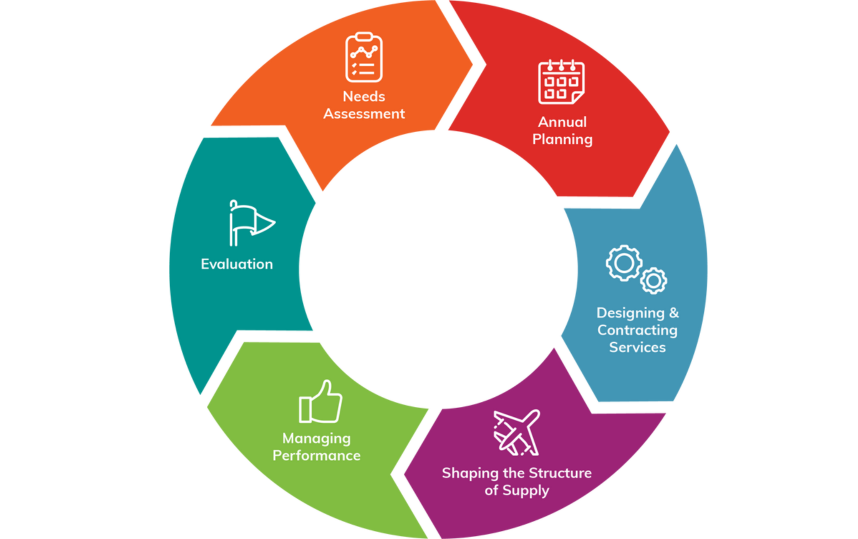Our vision is to commission for better health outcomes for people and communities who face barriers to accessing quality health care and experience ongoing poor health outcomes.

WA Primary Health Alliance is undertaking a number of activities to strengthen the way we perform our commissioning function across the entire commissioning lifecycle. The program of change will allow us to meet the evolving needs of our funder, the Australian Government Department of Health, Disability and Ageing and will run through to June 2026.
Why are we making these changes?
The Australian National Audit Office Effectiveness of the Department of Health and Aged Care’s Performance Management of Primary Health Networks recommendations, along with the Australian Government Department of Health, Disability and Ageing’s Strengthening Medicare Reform Agenda, are seeking improvements to how all Primary Health Network’s (PHN) commission health services, monitor and evaluate performance and report on outcomes achieved (value and impact – ultimately focused on health equity).
WAPHA endeavours to respond in a way that supports these directions, builds capability and capacity across the PHN network, and increasingly focuses on delivering value through all activities.
What are the benefits?
- Services delivered are better aligned to our strategies and needs assessments, through updated contractual service specifications and KPIs.
- Services delivered are inclusive and culturally competent.
- Values based commissioning.
- Enhanced monitoring, evaluation and KPI reporting to support understanding of outcomes achieved and benefit realisation.
- Improved access to health care from our under-served communities.
- Improved partnerships with commissioned service providers and health sector bodies.
- Onboarding of commissioned service providers streamlined.
- Procurement processes are open, fair and transparent.
- Performance feedback to support improvement and future tender opportunities.
What’s included?
While the changes will impact all of our commissioning activities, there will be an initial and added focus on three key health programs:

Mental health and suicide prevention
Alcohol and other drugs

Chronic conditions
(click to expand)
Standardising contract terms and conditions to maximise consistency and streamline the end-to-end procurement process with clarity on legislative terms ensuring fairness. Encompassing defined service specific contract schedules to ease contract management burden.
Design a fit for purpose and transparent end-to-end procurement framework. Improve and enhance policies, processes, documentation, forms and system capabilities with increased visibility and analytics through reporting.
Review Mental health and suicide prevention program (MHSP) service model(s), service specifications and agreed performance indicators to support successful commissioning of mental health services, ensuring alignment with our Mental Health Strategy, national objectives and PHN reporting requirements.
Review service model(s), service specifications and agreed performance indicators to support successful commissioning of alcohol and other drug services, including a co-design process with key stakeholders – ensuring alignment with WAPHA’s Alcohol and Other Drug Strategy, national objectives and PHN reporting requirements.
Review service model(s), service specifications and agreed performance indicators to support successful commissioning of chronic conditions services, ensuring alignment with our Chronic Conditions Strategy, national objectives and PHN reporting requirements.
Develop and implement a model for pricing of services across health program activities in place – occasions of service and episodes of care, focusing on delivering better value that improves outcomes and experiences at an individual person level.
Roll out the Performance Management Framework to all commissioned service providers, including user guides.
Alignment in performance expectations through the Performance Management Framework, and new improved standardised contract. Monitoring of data by commissioned service providers and WAPHA, through the Commissioned Services Reporting Portal, helping drive continuous improvement.
Introduction and implementation of the Inclusive and Culturally Competent Commissioning Guidelines outlining the expectations of commissioned service providers and WAPHA in delivering inclusive and culturally competent care.
These guidelines will be included in the procurement framework for new and existing procurement activities, requiring self-assessment and a commitment to continual improvement in inclusive and culturally competent commissioning from all commissioned service providers.
To ensure WAPHA’s commissioned service providers are kept informed and feedback is captured, we undertook consultation with our Service Provider Panel. In December 2024, more than 35 Service Provider Panel members came together to hear about WAPHA’s commissioning journey and to discuss/provide feedback regarding opportunities and challenges relating to these changes. This initial engagement is not a one-off and will continue across all program areas in combination with our commissioned service providers.
As part of this work, we are undertaking a comprehensive review and redesign of our alcohol and other drugs (AOD) program.
We are working closely with peak bodies, the WA Mental Health Commission and people with lived experience of AOD issues, to ensure our AOD program is effective, inclusive, and responsive to community needs.
To support this, we are holding a series of workshops with key stakeholders from the AOD sector in early 2025 to identify opportunities and make recommendations to drive improvements in planning and commissioning AOD activities.
We will keep commissioned service providers updated throughout the process. Current contracts expire in June 2026 and are not affected by this process.
